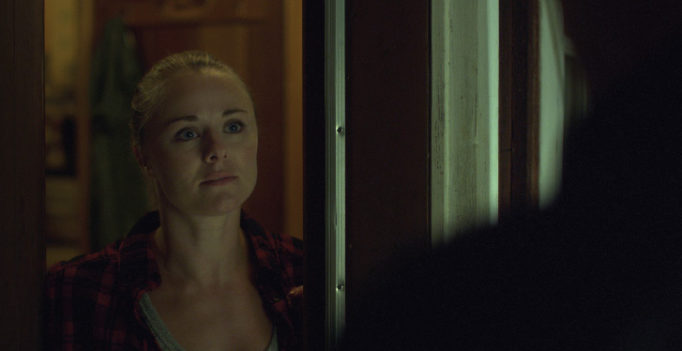Poor Agnes got under my skin in several ways.
An enigmatic woman coops herself up in a cabin, which sounds non-threatening but she’s very dangerous. The audience learns her name is Agnes Poelzl, and that she holds a connection to a local man’s disappearance. Mike Mercer, a hired private investigator who has been burning the midnight oil around this missing person case, contacts Agnes for a meet-up under an alias. During their meeting, the audience learns of how manipulative and apathetic Agnes is. With a sudden drop of his poker face, Mike falls victim for Agnes’ ways – a deceptive experience that toys with his trust as Agnes centres in on her next prey.
On its surface, Poor Agnes works as a slow burning hostage movie and an effective psychological thriller. If Tom Six (The Human Centipede) ever removes his head from his derrière, perhaps he’ll make a movie like this one day. However, the American Psycho-inspired production also wants to subvert the film’s roles with a gender swap. That’s a clever idea, and that proposal has worked before (Tricia Lee’s Clean Break, for instance), but Poor Agnes’ screenwriter and director are out of sync. Director Navin Ramaswaran’s aspirations to make an emotionally challenging yet narratively straightforward thriller is suited well for this modest film, but J. Gordon Ross’ heavy-handed screenwriting is desperately seeking validation from the audience for his ambition.
Agnes is a great character, and she’s played sensationally by Lora Burke. Burke dives into her despicable role, and makes the audience twist and squirm with discomfort as she uses and abuses the people she kidnaps. Bits of background describing the origins of her psychotic power trips help detail Burke’s characterization. The trapped men are portrayed with diligence, even though I didn’t completely believe Mike’s immediate vulnerability upon first meeting Agnes. These roles are usually typecast with a male dominating weary women. The audience is aware of the switch, and they can pick up on the differences Poor Agnes provides. Ross doesn’t need to fish for compliments.
Even though I was effectively moved by Ramaswaran’s Poor Agnes and was rightfully worried about what would happen next, I wish the film would’ve utilized silences more. Another flaw in the script is that Ross gets too distracted by his own monologging dialogue. Unpredictable moments are best established through quiet exchanges and inner thoughts conveyed through facial expressions. In Poor Agnes, a quiet lull is considered boring – an unfortunate realization for movie goers who realize that Burke’s blank stares are the key to drawn-out unease.
Poor Agnes is still a solid endeavour. And if this film propels Lora Burke’s to leading lady status, then it was all worth it.
**********
Do You Tweet? Follow These Tweeple:
Addison Wylie: @AddisonWylie



Be the first to comment